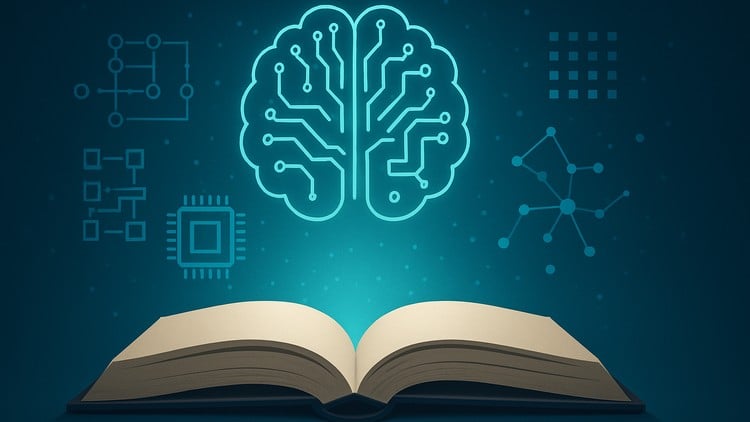
Master AI by building 100 real-world projects using Python, LLMs, agents, tools like LangChain, Ollama, and Streamlit
⏱️ Length: 3.1 total hours
⭐ 4.02/5 rating
👥 13,824 students
🔄 June 2025 update
Add-On Information:
Note➛ Make sure your 𝐔𝐝𝐞𝐦𝐲 cart has only this course you're going to enroll it now, Remove all other courses from the 𝐔𝐝𝐞𝐦𝐲 cart before Enrolling!
-
Course Overview
- This immersive course transforms beginners into proficient AI practitioners using a “learn-by-doing” ethos, spanning the complete AI development lifecycle.
- Structured as an intensive apprenticeship, it features an extraordinary volume of hands-on projects to solidify theoretical understanding and build practical AI problem-solving instincts.
- The ‘AI Bible’ cultivates an innovative builder’s mindset, enabling learners to independently conceptualize, design, and implement sophisticated AI systems.
- It offers a holistic view of AI, integrating diverse sub-fields and methodologies into an actionable skillset for creating powerful, intelligent applications.
- With continuous updates (June 2025), the course ensures content remains at the cutting edge, preparing students for the dynamic evolution of AI technologies.
-
Requirements / Prerequisites
- A foundational grasp of Python programming, including basic data structures and functions, is highly beneficial for the project-centric curriculum.
- Familiarity with command-line interfaces and managing development environments will streamline project setup and execution.
- A conceptual understanding of core machine learning principles (e.g., data handling, model evaluation) provides a strong springboard for advanced topics.
- A modern computer with adequate CPU/GPU power and RAM is recommended for smooth local execution and fine-tuning of AI models.
- Genuine curiosity for AI and a persistent, proactive attitude towards learning and troubleshooting are crucial for course success.
- Reliable internet access is necessary for initial setup and downloading extensive resources, though many components support offline development.
-
Skills Covered / Tools Used
- Deep practical expertise in applying leading open-source deep learning frameworks to various AI tasks across multiple data modalities.
- Mastery in orchestrating advanced AI workflows and building intelligent agents capable of dynamic reasoning and interaction.
- Robust capabilities in rapidly prototyping and deploying interactive AI applications, from user interfaces to scalable backend services.
- Advanced skills in optimizing and customizing large language models for specific domain needs, including efficient local and privacy-focused deployments.
- Proficiency in managing and querying vector databases, essential for building context-aware AI systems and enhancing RAG capabilities.
- Ability to integrate diverse AI functionalities—natural language, computer vision, speech processing—into cohesive, multi-modal applications.
- An advanced understanding of ethical AI development, applying principles for fairness, transparency, and accountability in systems.
- Adeptness at constructing comprehensive, end-to-end AI solutions, spanning data ingestion, model training, application development, and production-ready deployment.
-
Benefits / Outcomes
- Graduates will possess a highly diverse and functional portfolio of AI projects, immediately showcasing practical expertise to employers.
- Intensive project-based learning accelerates career readiness, building confidence for roles in AI engineering, ML development, and data science.
- Learners gain a profound architectural understanding of modern AI systems, enabling autonomous design and troubleshooting of complex applications.
- The course cultivates an adaptable skillset, preparing participants to quickly learn and master emerging AI technologies and paradigms.
- It effectively bridges the gap between theoretical AI knowledge and impactful, practical AI product development demanded by industry.
- Students gain a unique advantage in building privacy-centric, locally-run AI solutions, valuable for data sensitivity and edge computing trends.
- The curriculum instills a “builder’s mindset,” transforming participants into proactive innovators capable of crafting sophisticated, AI-driven solutions independently.
- Ultimately, this positions learners as versatile AI professionals capable of contributing across a broad spectrum of AI projects and sectors.
-
PROS
- Unparalleled Practical Exposure: 100 projects ensure deep, hands-on experience, solidifying concepts through extensive, iterative application.
- Career-Ready Portfolio: Every project contributes directly to a robust, demonstrable portfolio, significantly boosting marketability for AI/ML roles.
- Cutting-Edge Relevance: The June 2025 update guarantees currency, covering the latest in LLMs, agentic systems, and development tools.
- Holistic Skill Development: Beyond coding, fosters critical thinking, problem-solving, and architectural design skills by building complex systems from scratch.
- Local-First Empowerment: Emphasis on local AI deployment provides invaluable skills for developing privacy-centric, cost-effective, and independent AI solutions.
-
CONS
- Significant Time Commitment Required: The extensive number of projects demands substantial time investment and sustained dedication for effective completion.
Learning Tracks: English,Development,Data Science
Found It Free? Share It Fast!